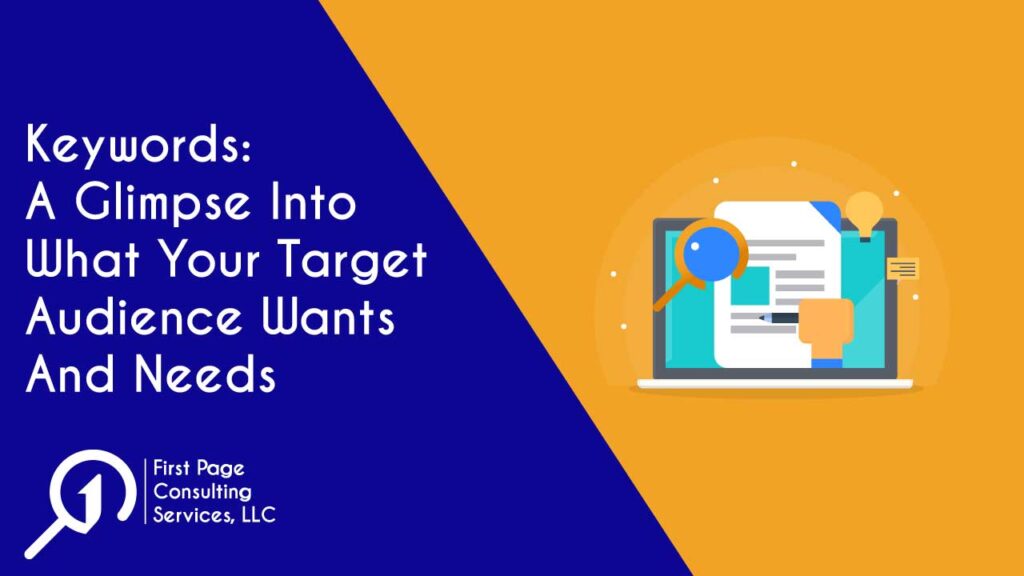
Don't miss another Post. Sign up for our newsletter.
Keywords - A Glimpse Into Determining What Your Target Audience Wants And Needs
This is the second in a series of articles on getting your website found and SEO Strategy. Make sure you check out the other articles in the series:
- We Need to Talk About an SEO Strategy. It’s A Necessary Evil
- Keywords: A Glimpse into Determining What Your Audience Wants and Needs
- Boost Site Authority So Google And Your Visitors Take You Seriously
- Is Your Site Trustworthiness Affecting Your Search Engine Ranking?
- Can the Small Guy Win? Relevancy Matters!
- Let’s Talk About User Behavior and How It Impacts Search Rankings
- Putting it all Together: Developing a Strong SEO Strategy
Let’s chat about keywords. What are they? What keywords should I use? Well, keywords are the words your target audience types into their search engine (for example Google or Bing), when looking for information on something you can help them with. Keywords are the foundation of any SEO strategy.
Keywords and Key Phrases
Before we continue, it is important to realize that we’re not talking about single words here. You’re page isn’t going to rank for “milk” for instance, even if you are a dairy farmer and that’s what your customers are looking for. Instead, what you want to use are longer key phrases that give you a good clue of what your people are looking for.
Let’s take the dairy farmer example a bit further. Let’s pretend you are a small dairy farmer and you sell fresh milk at the farmers market. And you’ve been hearing people say they are interested in making butter. A key phrase for a blog post or article could be “how to make butter at home with fresh milk” or something similar.
If I were to blog about SEO and I wanted to reach people interested in training or a guide to help them determine what their customers and readers are looking for, I may use a key phrase like “best way to find targeted keywords” or even “how to discover what people are searching for online.”
How To Find These Keywords
Now that you understand what keywords are, the next question you are probably asking is “where do I find those keywords’. Or “How do I find out what my target audience is typing into their search engine?”

It starts with a guess
Yes, you read that right – a guess. You should know enough about your niche and the topic at hand to come up with a list of words and phrases that you think your readers might be using.
From there you have options.
One of your best and free tools in determining what your target audience wants and needs is Google. Start to type in one of your keywords into the search box and see what the autofill options are. Try different terms and start making a list. Once you have that list, search each term and scroll to the bottom of the first search results page. There you will see a list of related searches. Add related search terms to your list of keywords and key phrases. Then choose several that make sense for you and the type of content you want to create.
Another option is to use a keyword tool.
If you use Google AdWords, or at least have an AdWords account, you can use Google’s free tool (Keyword Planner) which provides you with some insight into search volume and so forth. Other paid keyword tools are also available including:
Check out our blog on Keyword Hunting for more hints and tips.
What To Do With Keywords
Since you have your list of keywords, you can now use them where it makes sense in the title and content of your blog posts, articles, video descriptions, etc.
Don’t force it.
Always write for your readers first, search engine second. If you can, use it in the blog or page title and use it within your content. Use it multiple times, use different variations of your main keyword within your content – depending on length.
Don’t overdo it.
Remember the purpose is to help both your readers (first) and the search engines (second) see what your content is about. Determining what your target audience wants and needs isn’t always easy, but with practice it gets easier… and besides, it’s worth it!
In case you missed it, we did an article earlier this month on SEO strategy called: We Need To Talk About An SEO Strategy. It’s A Necessary Evil. You should check it out.